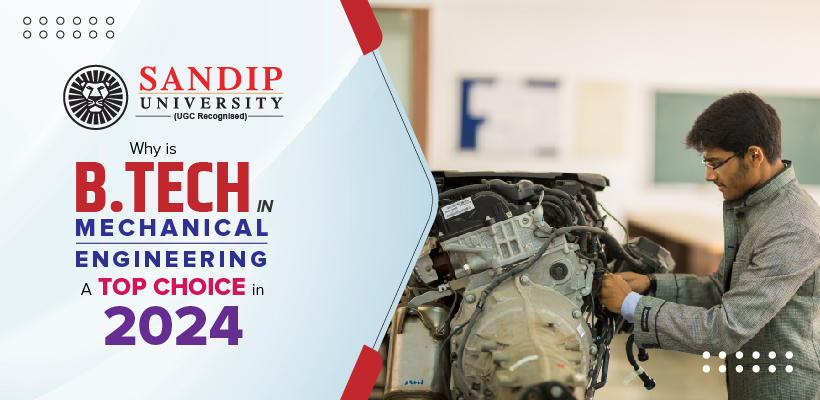As we step into 2024, pursuing a B.Tech in Mechanical Engineering remains a top choice for aspiring engineers due to several evolving factors that align with the latest industry transformations. While traditional mechanical roles have been foundational, the field is witnessing a paradigm shift driven by emerging technologies, sustainability demands, and interdisciplinary applications, creating a surge in demand for mechanical engineers with modern competencies. Pursuing a B.Tech in Mechanical Engineering from one of the best engineering colleges in Bihar can boost your career in a positive direction.
Even amidst the challenges posed by COVID-19, mechanical engineering has remained a vital field. With the emergence of the Fourth Industrial Revolution, technologies such as artificial intelligence (AI), advanced robotics, cognitive automation, and the Internet of Things (IoT) are gaining prominence. This shift is anticipated to generate more job opportunities in mechanical engineering, mirroring trends observed in the past.
Here is a look at the key trends driving this evolution and the opportunities they present:
1. Integration with Digital Technologies
The advent of Industry 4.0 has revolutionised mechanical engineering. Smart manufacturing, robotics, and digital twins are no longer concepts of the future; they are integral to today’s production processes. Mechanical engineers are now collaborating closely with AI, machine learning, and IoT to optimise operations. This digital shift has expanded traditional job roles, requiring a unique blend of mechanical design expertise and data-driven insights.
2. Focus on Sustainable Engineering
Sustainability is now a critical focus across all industries, and mechanical engineers are at the forefront of this movement. With increasing pressure to minimise carbon footprints and innovate greener technologies, these engineers are key players in developing energy-efficient systems and renewable energy solutions, such as wind and solar power. Their involvement in the automotive sector—particularly with electric vehicles—highlights the growing demand for professionals who can drive sustainability.
3. Rise of Additive Manufacturing and Advanced Materials
The rise of additive manufacturing (3D printing) has significantly impacted mechanical engineering. This technology allows for the creation of complex parts with reduced waste and lower costs. Engineers must now become proficient in advanced materials, including composite materials and auxetics, which offer enhanced performance in fields like aerospace and automotive. This skill set is vital for those looking to stay competitive in the industry.
4. Reskilling and Multidisciplinary Approach
Today’s mechanical engineers are expected to possess a diverse skill set that extends beyond traditional engineering knowledge. Proficiency in coding, data analysis, and simulation software (like Ansys, Abaqus, Fortran) is increasingly important. Consequently, many engineering programs are evolving to incorporate these essential skills, preparing students for interdisciplinary roles in biomechanics, mechatronics, and renewable energy systems. This adaptability provides a significant advantage in a competitive job market.
5. Innovation in Transportation and Aerospace
Mechanical engineers are crucial in designing next-generation transportation systems. The rise of electric and autonomous vehicles, coupled with advancements in aerospace technology, demands innovative thinking and integration of mechanical design with emerging technologies. Companies are actively seeking professionals who can harness machine learning for performance optimisation, further underscoring the importance of this skill set.
6. Global Infrastructure Development
With governments worldwide investing in smart cities and large-scale infrastructure projects, the demand for mechanical engineers continues to surge. These professionals play a vital role in designing and implementing efficient systems in construction, HVAC, water management, and renewable energy integration. The emphasis on creating sustainable and resilient infrastructure is critical in meeting the demands of modern society.
7. Advances in Supply Chain and Manufacturing
The global supply chain is undergoing a transformation, creating new roles for mechanical engineers focused on optimising logistics and manufacturing processes. The integration of automation, robotics, and artificial intelligence in smart factories is changing how goods are produced and delivered. Mechanical engineers are now pivotal in designing advanced manufacturing systems that enhance efficiency, flexibility, and resilience.
8. Growth in Defence and Biomedical Sectors
The demand for mechanical engineers in the defence and biomedical sectors is rapidly increasing. In defence, engineers design advanced machinery, autonomous vehicles, and robust materials. In biomedicine, they contribute to developing prosthetics, implants, and medical devices, utilising techniques like additive manufacturing and biomechanical modelling. This intersection of mechanical engineering with healthcare and defence is driving a new wave of innovation and demand.
Conclusion
B.Tech in Mechanical Engineering program from a top mechanical engineering college in Sijoul offers a vast array of opportunities across traditional and emerging sectors. Today’s mechanical engineers are not confined to classical mechanics; they are multidisciplinary innovators shaping the future of technology, sustainability, and digital transformation. This evolution ensures that the field remains relevant and attractive, drawing in students eager to make their mark in a rapidly changing world. Whether in smart manufacturing, renewable energy, or biomedical applications, the future is bright for those who choose this path.

